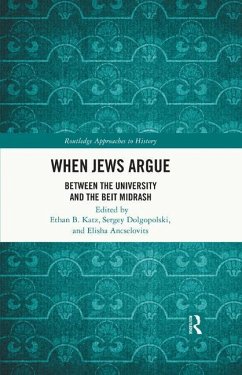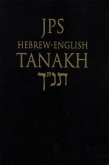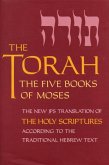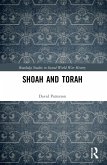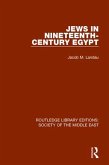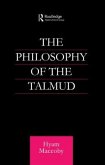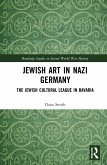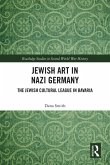This book re-thinks the relationship between the world of the traditional Jewish study hall (the Beit Midrash) and the academy: Can these two institutions overcome their vast differences? Should they attempt to do so? If not, what could two methods of study seen as diametrically opposed possibly learn from one another? How might they help each other reconceive their interrelationship, themselves, and the broader study of Jews and Judaism? This book begins with three distinct approaches to these challenges.
The chapters then follow the approaches through an interdisciplinary series of pioneering case studies that reassess a range of topics including religion and pluralism in Jewish education; pain, sexual consent, and ethics in the Talmud; the place of reason and devotion among Jewish thinkers as diverse as Moses Mendelssohn, Jacob Taubes, Sarah Schenirer, Ibn Chiquitilla, Yair Hayim Bacharach, and the Rav Shagar; and Jewish law as a response to the post-Holocaust landscape. The authors are scholars of rabbinics, history, linguistics, philosophy, law, and education, many of whom also have traditional religious training or ordination.
The result is a book designed for learned scholars, non-specialists, and students of varying backgrounds, and one that is sure to spark debate in the university, the Beit Midrash, and far beyond.
The chapters then follow the approaches through an interdisciplinary series of pioneering case studies that reassess a range of topics including religion and pluralism in Jewish education; pain, sexual consent, and ethics in the Talmud; the place of reason and devotion among Jewish thinkers as diverse as Moses Mendelssohn, Jacob Taubes, Sarah Schenirer, Ibn Chiquitilla, Yair Hayim Bacharach, and the Rav Shagar; and Jewish law as a response to the post-Holocaust landscape. The authors are scholars of rabbinics, history, linguistics, philosophy, law, and education, many of whom also have traditional religious training or ordination.
The result is a book designed for learned scholars, non-specialists, and students of varying backgrounds, and one that is sure to spark debate in the university, the Beit Midrash, and far beyond.
"When Jews Argue is an ambitious and exciting volume that tackles a set of interlocking questions regarding the nature, purpose, and potential of the contemporary academe. The editors have assembled a remarkable group of essays that share a common goal: exploring the fertile contact point between traditional Jewish learning and academic scholarship, highlighting the overlaps between these approaches while demonstrating what they can, and should, learn from one another. Tapping into the resources of both the academy and the rabbinic tradition, the book seeks to chart a new path in which the mutual engagement of these realms is productive and enriching rather than divisive or isolating. The volume is sure to spark important conversations between individuals who hail from these two communities, but it also carves out room for another readership inhabiting the "third space" between the religious study-hall and the university. Anyone who approaches When Jews Argue with an open mind will come away inspired, challenged, and uplifted."
- Ariel Mayse, Stanford University
"This important and original book introduces us to a range of rigorously considered case studies that break down simplistic dichotomies between academic scholarship and religious devotion. The authors in this volume provide essential historical context for the divide between academy and beit midrash, while also offering conceptual and pedagogical paradigms to bridge the two. This book should be required reading for all those interested in engaging in rich intellectual dialogue across academic and religious difference."
- Jane Kanarek, author of Biblical Narrative and the Formation of Rabbinic Law
"When Jews Argue is a bold and innovative book. It raises challenging and important questions about Jewish studies for both the academic scholar and the religious Jew with scholarly curiosity. The editors and contributors address the difficult chasm between Jewish studies scholars based in the academy, and those more grounded in the traditional world of the Beit Midrash. The book features highly original essays on numerous fascinating topics, and includes several real models, in a range of areas of Jewish studies, for bringing together different fields and disciplines, and for bringing together knowledge from academic Jewish studies with knowledge from the Beit Midrash. We also learn about important issues or questions that are at the crossroads of those two worlds and that have therefore often been avoided or left unaddressed."
- Shai Held, President and Dean, The Hadar Institute
"The contributions in this volume productively analyze and reflect on different modes of studying Jewish thought, culture, and history in our postsecular age. Rather than seeking to reconcile the gap between a reified dichotomy - critical, dispassionate scholarship versus faithful study - these essays engage and refine the scholastic terms of engagement. A refreshing and generative approach to a vexed topic!"
- Mara Benjamin, author of The Obligated Self: Maternal Subjectivity and Jewish Thought
- Ariel Mayse, Stanford University
"This important and original book introduces us to a range of rigorously considered case studies that break down simplistic dichotomies between academic scholarship and religious devotion. The authors in this volume provide essential historical context for the divide between academy and beit midrash, while also offering conceptual and pedagogical paradigms to bridge the two. This book should be required reading for all those interested in engaging in rich intellectual dialogue across academic and religious difference."
- Jane Kanarek, author of Biblical Narrative and the Formation of Rabbinic Law
"When Jews Argue is a bold and innovative book. It raises challenging and important questions about Jewish studies for both the academic scholar and the religious Jew with scholarly curiosity. The editors and contributors address the difficult chasm between Jewish studies scholars based in the academy, and those more grounded in the traditional world of the Beit Midrash. The book features highly original essays on numerous fascinating topics, and includes several real models, in a range of areas of Jewish studies, for bringing together different fields and disciplines, and for bringing together knowledge from academic Jewish studies with knowledge from the Beit Midrash. We also learn about important issues or questions that are at the crossroads of those two worlds and that have therefore often been avoided or left unaddressed."
- Shai Held, President and Dean, The Hadar Institute
"The contributions in this volume productively analyze and reflect on different modes of studying Jewish thought, culture, and history in our postsecular age. Rather than seeking to reconcile the gap between a reified dichotomy - critical, dispassionate scholarship versus faithful study - these essays engage and refine the scholastic terms of engagement. A refreshing and generative approach to a vexed topic!"
- Mara Benjamin, author of The Obligated Self: Maternal Subjectivity and Jewish Thought

